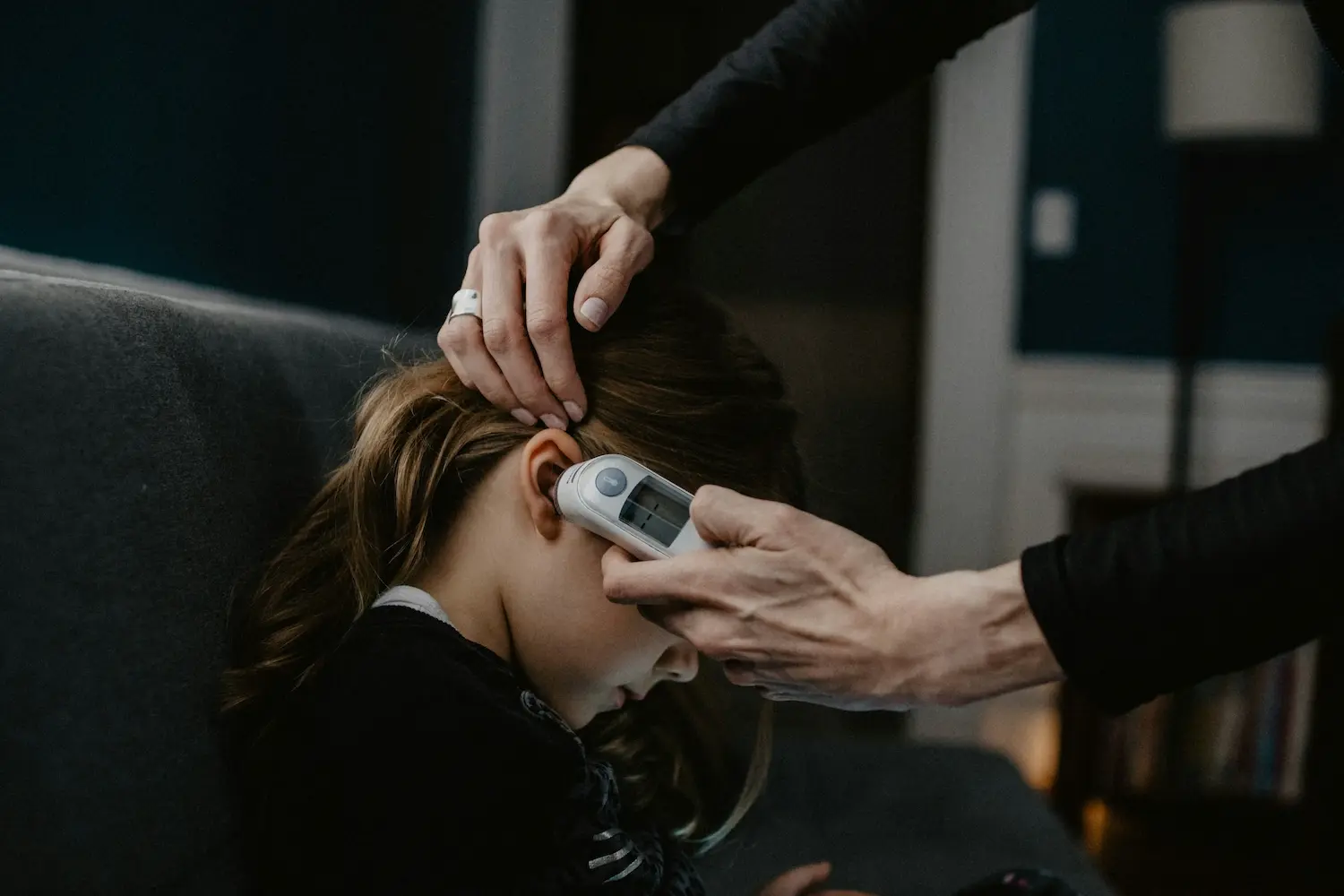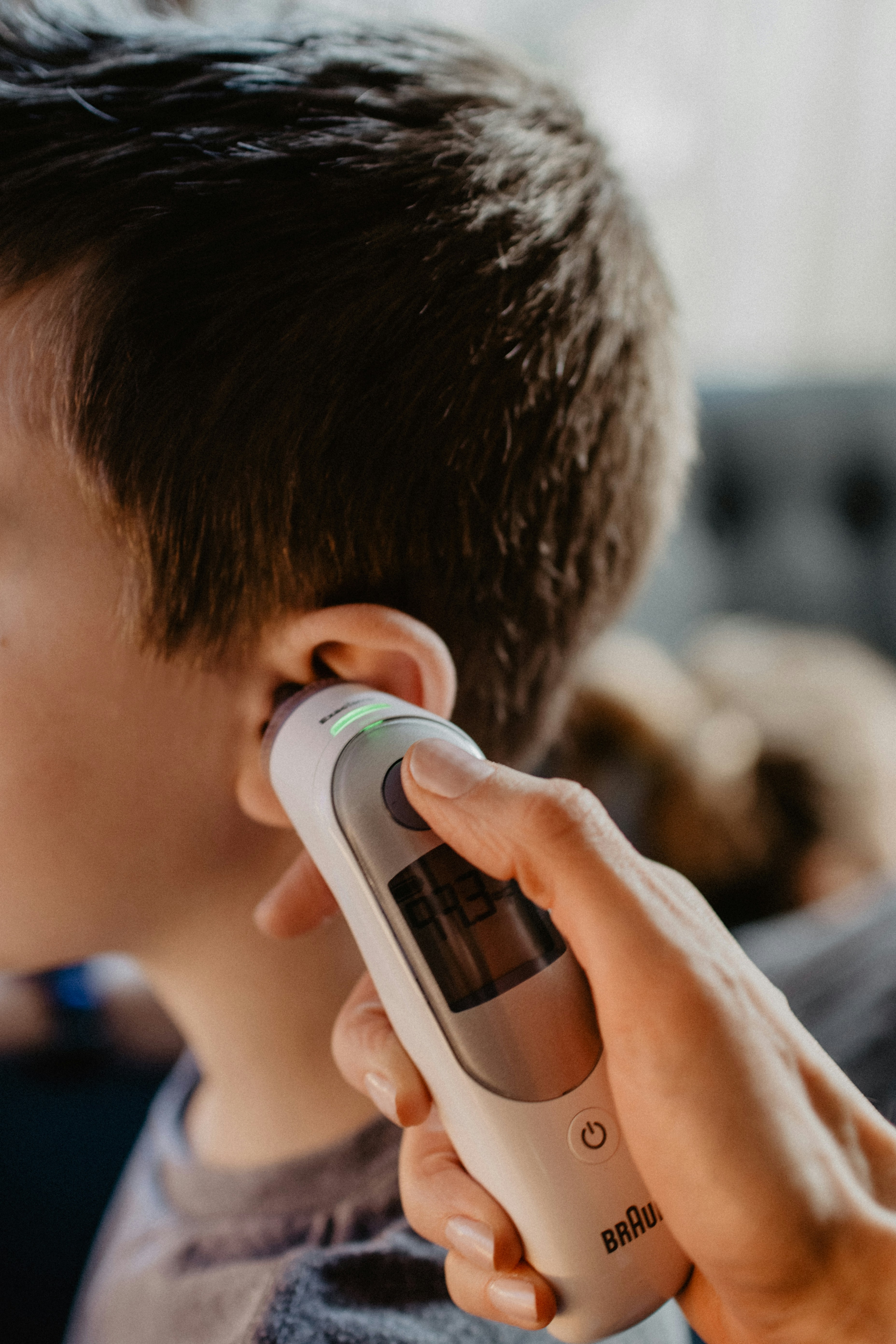Your baby’s medicine cabinet: What medicine can infants take?
Your baby’s medicine cabinet: What medicine can infants take?
When giving any medicine to newborns or infants, it’s important to do so carefully and with the support of a pediatrician. This article will explore medications most infants can take, medications infants should avoid, and tips for how to give your baby medications safely. Remember: for advice specific to your baby, talk to your pharmacist or local pediatrician, or text a Summer Health pediatrician.
When giving any medicine to newborns or infants, it’s important to do so carefully and with the support of a pediatrician. This article will explore medications most infants can take, medications infants should avoid, and tips for how to give your baby medications safely. Remember: for advice specific to your baby, talk to your pharmacist or local pediatrician, or text a Summer Health pediatrician.

Megan N. Freeland, PharmD
Content Writer

Dr. Marcy Borieux
Pediatrician



Can my infant take pain relievers?
Pain relievers — like acetaminophen (brand name: Tylenol) and ibuprofen (brand names: Advil, Motrin) — are useful medications. They help relieve pain like headaches and body aches, and also reduce fever.
Acetaminophen (Tylenol) for infants
Infants can take acetaminophen at any age. Follow the directions on the acetaminophen label closely to give your child the right amount. For newborns, however, always discuss symptoms with your pediatrician before giving any medication.
In some countries, acetaminophen is called paracetamol. These two medications are the same thing.
Ibuprofen (Advil, Motrin) for infants
Ibuprofen treats fever and pain in children 6 months or older. But there are some situations where ibuprofen may not be safe for your baby.
If your baby is under 6 months old, do not give them ibuprofen unless your doctor recommends it.
Some illnesses like asthma, kidney disease, or ulcers may make ibuprofen unsafe for your child. If your child has any medical conditions, check with your local pediatrician or a Summer Health pediatrician before giving ibuprofen.
Pain relievers to avoid
Do not give children of any age aspirin. Aspirin can cause a serious liver condition called Reye's syndrome, especially if used in children who have the flu or chicken pox. Be sure to read the ingredients in all your baby’s medications to make sure aspirin is not listed.
Can my infant take cough and cold medicines?
Whether your baby catches a cold in the cooler months or in the summer, there is no cure for the common cold. Over-the-counter (OTC) cough and cold medicines do not cure a cold. They only help relieve symptoms.
But many OTC cough and cold medicines are not safe for babies. In fact, OTC cough and cold medicines aren’t recommended for any children under 6 years old.
One reason they should be avoided is because cough and cold medicines usually include more than one medication. It can be easy to give your baby too much of a particular medicine when several are combined.
For example, some cough and cold medicines also contain acetaminophen or ibuprofen. If your child gets cold medicine and is also getting acetaminophen or ibuprofen separately, it could be easy to give them too much of the pain reliever.
For these reasons, it’s safest to avoid giving OTC cough and cold medicines to your baby or any child under 6 years old.
What other medications can infants take?
Below are a few other medicines many infants may need to take or use at some point, but note that this list doesn't include all medications babies can take.
Antibiotics: You won’t keep these in your medicine cabinet since you can only get antibiotics with a prescription in the US. But sometimes, your child may have a bacterial infection that requires antibiotics to treat. A few antibiotics commonly prescribed to infants and children include amoxicillin, amoxicillin-clavulanate (Augmentin), and cephalexin (Keflex).
Topical ointments for eczema relief: If your baby has eczema, your pediatrician may recommend a topical ointment or cream like hydrocortisone 1%, which is available over the counter. Your doctor may recommend a prescription-strength ointment or cream for more serious cases.
Diaper rash cream: Many diaper rash creams contain zinc oxide, an active ingredient that helps form a protective barrier that can help heal or prevent diaper rash.
How to give your child medications safely
When dealing with medications and babies, safety is a must. Here are a few medication safety tips to remember and practice:
Know your baby’s weight. Most medication labels will tell you how much medicine to give your baby based on their age or based on their weight. It’s always more accurate to dose your child's medication based on how much they weigh.
Read the label closely. Labels on OTC medicines give you important information about what a medicine contains and how to give it to your infant. If you aren’t sure about something on the medication label, ask your pharmacist or local pediatrician, or text a Summer Health pediatrician.
Use a syringe instead of a kitchen spoon, and measure in mL. Many medications — prescription or OTC — come with a measuring device like a syringe. Use the measuring device that comes with the medication to lower the risk of giving your baby the wrong amount of medication.
Keep medicines out of the reach of children. While most medication packaging is designed with features that keep children out, it’s safest to keep medications out of your children’s reach altogether.
Store them properly. Properly storing your medications means keeping them out of children's reach and keeping them at the right temperature. Most medications should be kept in a cool, dry location. But some medicines, like certain antibiotics, need to be refrigerated. You can always ask your pharmacist how to store a particular medication the right way.
What else should I keep in my baby's medicine cabinet?
In addition to pain relievers or fever reducers, here are a few supplies you should keep in your baby's medicine cabinet:
Medication syringe: A medication syringe will allow you to accurately dose your baby's medication.
Infant saline nasal drops: Saline drops help loosen mucus, making it easier to remove and relieve congestion.
Bulb syringe: If your baby's nostrils and nasal passages are congested, you can use a bulb syringe, along with infant saline nasal drops, to gently remove mucus..
Nasal aspirator: To remove mucus, you might find it easier to use a nasal aspirator than a bulb syringe.
Here are a few bonus items you may want to keep in stock too:
Pain relievers or fever reducers, like acetaminophen or ibuprofen (Remember: do not use ibuprofen for babies under 6 months old.)
Diaper rash cream
Hydrocortisone cream or ointment (especially if your baby has eczema)
What questions should I ask my pharmacist or pediatrician about medicines for my infant?
If you’re ever confused or unsure about what medicines your infant can safely take, you can always ask a pharmacist or local pediatrician, or text a Summer Health pediatrician. Here are examples of common questions that can come up:
Why is my baby taking this medicine, and how will it help them?
How much medicine should I give my baby?
How often and for how long should I give the medicine?
After starting this medicine, how long should it take for my baby to start feeling better?
What are this medicine's most common side effects, and how do I manage those side effects if they happen?
Are there any serious side effects I should look out for, and what should I do if they happen?
What if my baby spits out the medicine?
Does this medicine need to be refrigerated?
Can my infant take pain relievers?
Pain relievers — like acetaminophen (brand name: Tylenol) and ibuprofen (brand names: Advil, Motrin) — are useful medications. They help relieve pain like headaches and body aches, and also reduce fever.
Acetaminophen (Tylenol) for infants
Infants can take acetaminophen at any age. Follow the directions on the acetaminophen label closely to give your child the right amount. For newborns, however, always discuss symptoms with your pediatrician before giving any medication.
In some countries, acetaminophen is called paracetamol. These two medications are the same thing.
Ibuprofen (Advil, Motrin) for infants
Ibuprofen treats fever and pain in children 6 months or older. But there are some situations where ibuprofen may not be safe for your baby.
If your baby is under 6 months old, do not give them ibuprofen unless your doctor recommends it.
Some illnesses like asthma, kidney disease, or ulcers may make ibuprofen unsafe for your child. If your child has any medical conditions, check with your local pediatrician or a Summer Health pediatrician before giving ibuprofen.
Pain relievers to avoid
Do not give children of any age aspirin. Aspirin can cause a serious liver condition called Reye's syndrome, especially if used in children who have the flu or chicken pox. Be sure to read the ingredients in all your baby’s medications to make sure aspirin is not listed.
Can my infant take cough and cold medicines?
Whether your baby catches a cold in the cooler months or in the summer, there is no cure for the common cold. Over-the-counter (OTC) cough and cold medicines do not cure a cold. They only help relieve symptoms.
But many OTC cough and cold medicines are not safe for babies. In fact, OTC cough and cold medicines aren’t recommended for any children under 6 years old.
One reason they should be avoided is because cough and cold medicines usually include more than one medication. It can be easy to give your baby too much of a particular medicine when several are combined.
For example, some cough and cold medicines also contain acetaminophen or ibuprofen. If your child gets cold medicine and is also getting acetaminophen or ibuprofen separately, it could be easy to give them too much of the pain reliever.
For these reasons, it’s safest to avoid giving OTC cough and cold medicines to your baby or any child under 6 years old.
What other medications can infants take?
Below are a few other medicines many infants may need to take or use at some point, but note that this list doesn't include all medications babies can take.
Antibiotics: You won’t keep these in your medicine cabinet since you can only get antibiotics with a prescription in the US. But sometimes, your child may have a bacterial infection that requires antibiotics to treat. A few antibiotics commonly prescribed to infants and children include amoxicillin, amoxicillin-clavulanate (Augmentin), and cephalexin (Keflex).
Topical ointments for eczema relief: If your baby has eczema, your pediatrician may recommend a topical ointment or cream like hydrocortisone 1%, which is available over the counter. Your doctor may recommend a prescription-strength ointment or cream for more serious cases.
Diaper rash cream: Many diaper rash creams contain zinc oxide, an active ingredient that helps form a protective barrier that can help heal or prevent diaper rash.
How to give your child medications safely
When dealing with medications and babies, safety is a must. Here are a few medication safety tips to remember and practice:
Know your baby’s weight. Most medication labels will tell you how much medicine to give your baby based on their age or based on their weight. It’s always more accurate to dose your child's medication based on how much they weigh.
Read the label closely. Labels on OTC medicines give you important information about what a medicine contains and how to give it to your infant. If you aren’t sure about something on the medication label, ask your pharmacist or local pediatrician, or text a Summer Health pediatrician.
Use a syringe instead of a kitchen spoon, and measure in mL. Many medications — prescription or OTC — come with a measuring device like a syringe. Use the measuring device that comes with the medication to lower the risk of giving your baby the wrong amount of medication.
Keep medicines out of the reach of children. While most medication packaging is designed with features that keep children out, it’s safest to keep medications out of your children’s reach altogether.
Store them properly. Properly storing your medications means keeping them out of children's reach and keeping them at the right temperature. Most medications should be kept in a cool, dry location. But some medicines, like certain antibiotics, need to be refrigerated. You can always ask your pharmacist how to store a particular medication the right way.
What else should I keep in my baby's medicine cabinet?
In addition to pain relievers or fever reducers, here are a few supplies you should keep in your baby's medicine cabinet:
Medication syringe: A medication syringe will allow you to accurately dose your baby's medication.
Infant saline nasal drops: Saline drops help loosen mucus, making it easier to remove and relieve congestion.
Bulb syringe: If your baby's nostrils and nasal passages are congested, you can use a bulb syringe, along with infant saline nasal drops, to gently remove mucus..
Nasal aspirator: To remove mucus, you might find it easier to use a nasal aspirator than a bulb syringe.
Here are a few bonus items you may want to keep in stock too:
Pain relievers or fever reducers, like acetaminophen or ibuprofen (Remember: do not use ibuprofen for babies under 6 months old.)
Diaper rash cream
Hydrocortisone cream or ointment (especially if your baby has eczema)
What questions should I ask my pharmacist or pediatrician about medicines for my infant?
If you’re ever confused or unsure about what medicines your infant can safely take, you can always ask a pharmacist or local pediatrician, or text a Summer Health pediatrician. Here are examples of common questions that can come up:
Why is my baby taking this medicine, and how will it help them?
How much medicine should I give my baby?
How often and for how long should I give the medicine?
After starting this medicine, how long should it take for my baby to start feeling better?
What are this medicine's most common side effects, and how do I manage those side effects if they happen?
Are there any serious side effects I should look out for, and what should I do if they happen?
What if my baby spits out the medicine?
Does this medicine need to be refrigerated?
Summer Health offers fast and reliable pediatric urgent care through online doctors, all via text. Whether you’re worried about your baby's fever, rashes, or other children's health concerns, we provide expert advice and support anytime, right from your phone.

Never miss a post!
Sign up for our newsletter to receive articles and guides directly to your inbox!













